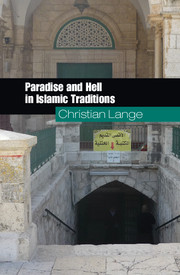Book contents
- Frontmatter
- Dedication
- Contents
- List of Figures
- List of Table and Charts
- Acknowledgements
- List of Abbreviations
- Note on Dates, Citation, Translations, and Transliteration
- Introduction
- Part I Textual Foundations: Narrating the Otherworld
- 1 The Otherworld Revealed: Paradise and Hell in the Qur'ān
- 2 The Growth of the Islamic Otherworld: A History of Muslim Traditionist Eschatology
- 3 Hope, Fear, and Entertainment: Parenetic and Popular Muslim Literature on the Otherworld
- 4 The Imagination Unbound: Two Late Medieval Muslim Scholars on Paradise and Hell
- Part II Discourses and Practices: Debating the Otherworld
- Epilogue
- Primary Sources
- Secondary Sources
- Index of Names
- Index of Terms
1 - The Otherworld Revealed: Paradise and Hell in the Qur'ān
from Part I - Textual Foundations: Narrating the Otherworld
Published online by Cambridge University Press: 05 December 2015
- Frontmatter
- Dedication
- Contents
- List of Figures
- List of Table and Charts
- Acknowledgements
- List of Abbreviations
- Note on Dates, Citation, Translations, and Transliteration
- Introduction
- Part I Textual Foundations: Narrating the Otherworld
- 1 The Otherworld Revealed: Paradise and Hell in the Qur'ān
- 2 The Growth of the Islamic Otherworld: A History of Muslim Traditionist Eschatology
- 3 Hope, Fear, and Entertainment: Parenetic and Popular Muslim Literature on the Otherworld
- 4 The Imagination Unbound: Two Late Medieval Muslim Scholars on Paradise and Hell
- Part II Discourses and Practices: Debating the Otherworld
- Epilogue
- Primary Sources
- Secondary Sources
- Index of Names
- Index of Terms
Summary
Even a cursory reading shows that the Qurʾān is a text that is deeply concerned with the relationship between this world (al-dunyā) and the otherworld (al-ākhira). The Qurʾān states that, next to the belief in God, His angels, scriptures, and prophets, the belief in the “last day” (al-yawm al-ākhir) is one of the five essential tenets of faith (4:136); this contrasts with the view of those who deny the message brought by Muḥammad, “who say: ‘There is none but our worldly life, and we shall not be resurrected’” (Q 6:29). In virtually every sura one finds verses, often long passages amounting to colourful tableaux, that relate to the events surrounding resurrection, judgement, paradise, and hell. Roughly a tenth of the Qurʾān, perhaps more, deals with matters eschatological. The terms al-dunyā and al-ākhira, in their cosmological sense, each appear in 108 verses of the Qurʾān. In half of these instances, that is, in fifty-four verses, al-dunyā and al-ākhira are paired. In the other instances, al-dunyā is found in combination with synonyms of al-ākhira, or is accompanied by references to the Day of Judgement or the rewards in paradise (e.g., 3:14, 10:7–10; 11:15–16; 33:28–29). Meanwhile, al-ākhira occurs several times in tandem with al-ūlā (“the first [abode],” e.g., 28:70). In sum, al-dunyā and al-ākhira are wedded closely in the Qurʾān.
What catches the eye is that al-dunyā (“the nearer [abode]”) is a spatial concept (cf. 37:6, 67:5), while al-ākhira (“the last [abode]”) denotes a temporal relationship. The Arabic adjective ākhir (“last”), however, oscillates into the semantic range of ākhar (“other”), both deriving from the same consonantal root (ʾ-kh-r). Al-ākhira, therefore, also indicates a spatially “distant” or simply, an “other abode.” As such, it also occurs as the antonym of “the earth” (al-arḍ, 28:83). The superiority of this “other abode” over the “nearer abode” is stressed throughout the Qurʾān. Al-ākhira is “better” (93:4, 12:109, 16:30, passim); the “enjoyment” of al-dunyā is trivial compared to that of al-ākhira (9:38); people are urged to “sell” their life on earth for life in al-ākhira (4:74); and so forth. Only al-ākhira offers a sense of structured security – it is “the abode of stability” (dār al-qarār, 40:39). The world of the here and now, by contrast, is “the fleeting one” (al-ʿājila, 17:18, 75:20, 76:23), a “place of temporary lodging” (2:35–6).
- Type
- Chapter
- Information
- Paradise and Hell in Islamic Traditions , pp. 37 - 70Publisher: Cambridge University PressPrint publication year: 2015



